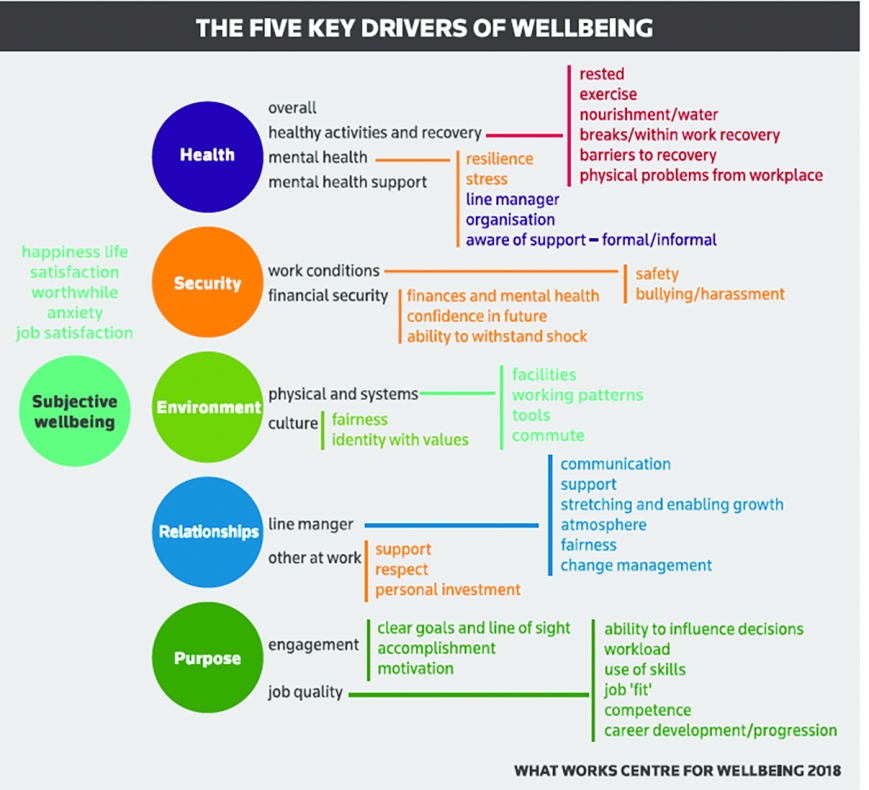The latest data from the World Health Organisation’s (WHO) “World Mental Health Report 2022” shows that we are living in the most depressed, anxious, overstimulated and medicated society history has known. These feelings and experiences have penetrated our personal, social and professional lives, including the way we study and interact at our universities.
The Spring 2019 Equal Opportunity and Mental Health Survey performed by VSETH at ETH reported that 50–55% of the participants with good or very good mental health have nevertheless continuously experienced sleep problems, anxiety, low self-esteem, depression or hopelessness. The majority of us will have either experienced this ourselves or know someone who has struggled with mental health problems. So what can we do?
Expand your language on human feelings and experiences
Naming our feelings and experiences is crucial to the way we interact with them. Language not only serves us to communicate, but also shapes our experiences. The ability to recognise, name and express those feelings, known as emotional literacy, is key to our wellbeing. In the wise words of Ludwig Wittgenstein, “The limits of my language mean the limits of my world.”
Brené Brown spent more than 20 years studying courage, vulnerability, shame, and empathy. In her latest book, “Atlas of the Heart”, she explores 87 human feelings and experiences based on her extensive research. The results solidify the view that using the right language for the right feeling is essential, so that we can express ourselves, recognise what we need and get help. For example, do you know the difference between stressed, overwhelmed and anxious? Can you tell when you feel compassion, connection or amusement?
Be kind to yourself
It seems that we possess an inexhaustible ability to put ourselves down. We tend to be systematically judgmental and criticising when confronted with our personal inadequacies and shortcomings. This inevitably affects our mental health and how we perceive the world and ourselves in it.
According to Kristin Neff, considered one of the world’s most influential research psychologists and a pioneer in the study of self-compassion, we need to cultivate practices to be warm and understanding toward ourselves when we fail, suffer or feel inadequate. She points out self- kindness, that is to talk to ourselves the way we would talk to someone we love, as a vital element of self-compassion.
We need to focus more on mental health
According to the constitution of the WHO “Health is a state of complete physical, mental and social well-being and not merely the absence of disease or infirmity”. WHO has officially recognised the significance of mental health and has undertaken actions to support mental health care. This clearly points out that our mental wellbeing is an issue that has reached a global scale and requires our devoted attention at all levels of our lives.
Our universities, including ETH, have adapted to the changing world, creating state-of- the-art and high-quality education. However, this has also created highly demanding environments in which the mental health of students and staff at all levels is affected. It lies within our responsibilities to systematically destigmatise the topic of mental health, commit to the value of mental wellbeing, and strengthen the support provided for it.

The Mental Wellbeing (MeWell) Community consists of students and staff members from Zurich universities dedicated to improving and promoting mental wellbeing in academia. Tiara Greber, MeWell Vice President, shared some of the MeWell insights.
What is the most important thing our readers should know about mental health in academia?
Mental health in academia is still highly stigmatised in Switzerland and it is not often talked about. However, one in four young Swiss adults shows symptoms of mental health disorders. Still, the situation is slowly improving and the services at ETH might be a helpful first point of reference if you feel the need to open up about what you’re going through.
What are the most common mental health-related issues people approach you with?
The event topics most people come to us with and have considered relevant according to our post-event surveys include isolation/loneliness, impostor syndrome, grieving, failure culture and perfectionism, anxiety, depression, wellbeing theories, exercise, mental resilience, building connections and friendships, or when to look for professional help.
What advice would you give to people at ETH who are dealing with mental health issues?
Ignore the stigma. Find a safe space to talk about it – a family member, friends, professionals. Seek out counselling available to people at ETH. Have a support system early on in your studies. Join stigma-free groups like MeWell to stay in touch with reliable mental health resources. Stay connected to others as they can help you identify when you may need professional help or provide relief in times of crisis.
I had the pleasure to speak with doctors Paul Andrä, resident in child and adolescent health at the Zurich Children´s Hospital and co-director of On The Move e.V. (the NGO behind the Mental Health Allyship Programme “Aufeinander Achten”), and Robert Bozsak, a psychiatry resident in Zurich. Paul and Robert are dedicated to empowering communities to take care of their mental health. They gave us some insights into important mental health issues.

Robert Bozsak

Paul Andrä
What actions can universities take to promote and improve the mental wellbeing of their students and staff members?
Paul: Universities can address this in two major directions.
First, Content & Skills – to teach valuable skills to help the students with the challenges they will face in their professional and private lives. Creativity and adaptivity should be encouraged and developed to empower discovery before static knowledge. More interdisciplinary projects guided by human-centred design would promote empathy, teamwork and problem solving.
Second, Environment & Architecture – universities can apply the principle of ‘Healing Architecture’ when designing spaces to create green areas and good lightning. They can also provide spaces for focused work, hanging out, sharing and development of ideas, and execution of events at the campuses.
Robert: It is of paramount importance to acknowledge that mental wellbeing is a central building block of academic success. Generating awareness about mental health, its preservation and treatment options are essential. Promoting ‘mental hygiene’ or ‘mental health check-ins’ as a new common practice is one strategy universities could develop to help students and staff.
What skills would you recommend each of us add to our toolbox in case of a mental health crisis?
Paul: Everyone should obtain a good awareness of their basic needs, which include sleep, nutrition, movement, sex, social connectedness, self-efficacy, sense-of-self, and existential safety, and find ways to satisfy these needs.
Robert: Build protective routines that help strengthen your mental resilience such as: daily mental health check-ins of your bodily and mental wellbeing, reflection on current needs, detaching from negative thoughts and worries. Have regular contact with close and loved ones; regular physic activity, ideally in a social setting; practice mindfulness, i.e. experience the moment as it is without rating or changing it; use imaginative or meditative approaches to build inner safe spaces or delightful experiences in your mind helping you out during stressful periods. Use all your senses to live the moment.
What can each of us do to support someone with mental health issues?
Paul: Non-judgmental and active listening are important. The method of non-violent communication can be used as a guideline. Seeing each other is valuable in everyday interactions. It creates a good foundation for good mental health as well as it helps to detect mental health issues and seek help.
Robert: Building trust is the basic ingredient of every relationship. Listen open-mindedly, trust your gut feeling, know your limits (and ask for help when necessary), create a safe space where someone can explain their issues without feeling judged. Whether giving or receiving help, know your own (psychological) limits and do not feel solely responsible for helping the other person. You may share the situation with others and ask them for advice, too!
by Tihomir Todorov
Resources for Mental Health Support
Reaching out for support as well as openly speaking about our mental health experiences are vital steps for our wellbeing. Here are some resources and links:
Health and Contact Points on Student Portal (ETHZ): relevant information on counselling, coaching and psychological support for students as well as more resources and phone lines in case of a mental health emergency. mewellcommunity.ch
aufeinanderachten.de: a mental health course for everyone
brenebrown.com (Brené Brown)
self-compassion.org (Kristin Neff)
whatworkswellbeing.org: aim to improve people’s wellbeing as it is the ultimate goal of effective policy and community action
The Centre for Nonviolent Communication: cnvc.org
The Student Mental Health Research Network: smarten.org.uk
WHO Mental Health webpage:who.int/health-topics/mental-health

